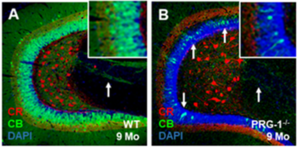
Bioactive lipid levels are modulated by peripheral metabolism and regulate synaptic transmission in the brain. Our data suggest that synaptic lipids may lead to cortical network hyperexcitability, an important disease driver in the aging brain.

Cortical network excitability depends on excitation/inhibition (E/I)-balance and is homeostatically regulated. Peripheral derived lipids regulate synaptic transmission and E/I-balance. Increased cortical network excitability was shown to be induced by metabolic challenges like fasting but was also described in the ageing brain reducing memory performance. We have shown that synaptic lipid-signaling plays a critical role in age-related brain disorders like stroke leading to neuronal demise.
Hyperexcitability of neuronal networks is a characteristic feature associated with premature brain aging and was described in neurodegenerative disorders like Alzheimer´s disease. Our research focus is on the maladaptive role of synaptic lipid signaling and its modulation by metabolic changes in the aging, in the prematurely aging brain as well as in age-related disorders like stroke.
Our aim is to understand the role of peripheral derived bioactive lipids on synaptic transmission, their modulatory role on cortical hyperexcitability and their importance for brain function and age-related brain disorders. Bioactive lipids are key players in modulating interactions of neuronal and glial networks.
We aim to understand the interplay of metabolic modulated lipids, lipid signaling at the brain synapse, cortical network hyperexcitability, aging, and related disorders arising from misbalance of these factors. Our data suggest that altered synaptic lipid signaling i.e. by human mutations of the synaptic regulatory molecule PRG-1 (PRG-1R345T) increases brain network excitability. Neuronal network hyperexcitability may induce a vicious circle leading to pathological metabolic conditions (obesity, DMT2), and to a premature brain ageing. We could show that synaptic lipid-related neuronal hyperexcitability is critical in excitotoxic cell death leading to higher ischemic damage in age-related disorders like stroke (Bitar et al., 2022). To tackle this problem, we developed and applied for a patent for a novel small-molecule inhibitor of the synaptic lipid synthesizing molecule autotaxin (ATX, WO 2023/046727), which is in the preclinical phase and will soon proceed into a Phase I study.
Synaptic lipids increased cortical network excitability already in middle-aged brains (Fischer et al., 2021) while a pre-existing cortical hyperexcitability (i.e. induced by PRG-1R345T) enhanced brain damage after stroke leading to a worse outcome in mice and humans (Bitar et al., 2022). Nevertheless, metabolic stress, i.e. induced by fasting, increased peripheral-derived bioactive lipid levels in the brain enhancing cortical excitability and elevating fasting-induced hyperphagia. In line, human PRG-1R345Tmutation carriers displayed higher BMI and elevated DMT2 prevalence. Since obesity is a risk factor for Alzheimer`s disease (AD) and cortical network excitability is typically found in AD, our data showing a direct impact of synaptic lipid signaling on age-related cortical excitability and cognitive decline suggest a close association between bioactive lipids and premature aging. We follow a translational approach that ultimately aims at therapeutic interventions for successful aging.
